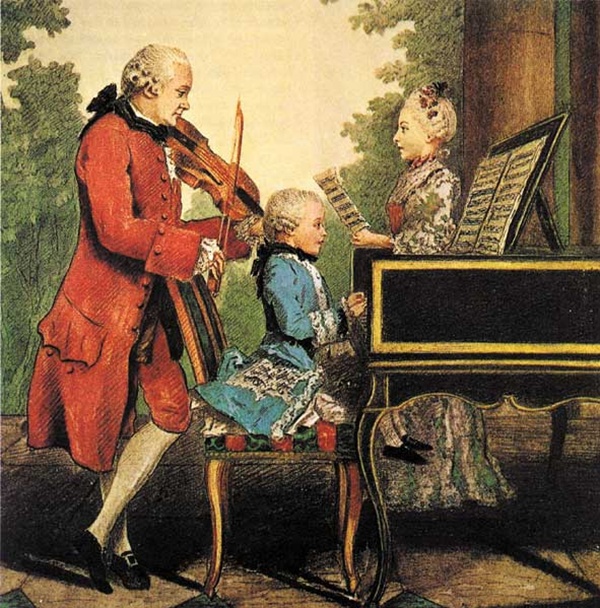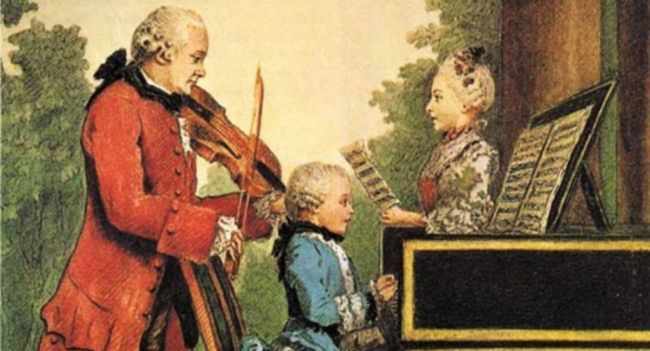At the age of 3, Mozart, full name Wolfgang Amadeus Mozart (1756–1791), demonstrated his genius by performing music fluently like an experienced artist. At the age of 4, Mozart could play the ancient piano and organ. A year later, the Austrian boy surprised everyone by becoming an excellent keyboard composer, writing orchestral pieces at the age of 6; at age 8, composing violin sonatas; and at age 13, he was appointed a conductor by the Archbishop of Salzburg and received a salary from the Church. Mozart’s talent was called by his contemporaries “the miracle that God blessed Salzburg.”.
Bach met Wolfgang Amadeus Mozart, who was eight years old when they met in 1764, at the request of Mozart’s father. Bach, having completed his composition course, taught Mozart for five months.
In fact, there are many interesting and mysterious things surrounding Mozart’s childhood life and musical talent. The first musical achievements of the boy who grew up in Salzburg were the result of a special educational model, and it is undeniable that Mozart’s later mastery is a wonderful example of the power of the road in the direction of training scientific people.

Mozart practicing the piano with his father, Leopold Mozart and his sister Nannerl at age 7; watercolor painting by Carmontelle (1763)
Mozart’s soul has been immersed in music since before he was born. His father, Leopold Mozart, was a composer, violinist, second violinist at the court in Salzburg, and also an eminent pedagogue and author of the book A Treatise on the Fundamental Principles of Violin Playing. (a treatise on the fundamentals of playing the violin). At one time, Leopold Mozart always wanted to become a great composer but failed. Then, when he became a father, he decided to put his youthful aspirations into his son while he was still in his mother’s womb. Before that, Mr. Leopold Mozart also trained his daughter Nannerl in the hope that she would make her parents proud.
When his older sister Nannerl was 4 and a half years old, Mozart was born and showed a natural ability to perceive music that was even more outstanding than that of his sister. From his childhood, Mozart paid close attention to his sister’s playing. A little older, every time Nannerl plays the harpsichord, a musical instrument that appeared in the 15th century, has keys and strings, in which the string is plucked with a piece of crow’s feather attached to the end of the key, shaped like a large piano. Mozart sat next to her, imitating and memorizing her actions. With sharp ears, endless curiosity, and family tradition running deep in his veins, the Austrian boy has made strong leaps in the process of approaching and acquiring far more musical knowledge. normal children.
As an experienced educator, Mr. Leopold Mozart knew how to develop his son’s talent. Mozart was not sent to school like his friends, but the father himself taught his son and eldest daughter at home. Accordingly, the main and mandatory subject is music, in addition to supporting subjects such as Latin, French, Italian, English, literature and drama, and background knowledge of a future composer. .

Mr. Leopold Mozart, a composer and violinist, was the second violinist of the court in Salzburg and also an outstanding pedagogue.
All the pent-up hopes of his youth were conveyed by Mr. Leopold Mozart into lessons for his son. These lessons were many times heavier than what he taught his daughter Nannerl, who was considered a musical prodigy at the time. At the same time, Leopold Mozart also publicly expressed his special priority for building his son’s career over his daughter’s. This is not an unrealistic chivalrous adventure but a rational calculation. Firstly, because of the natural talent that Mozart showed from the moment he was just a boy learning to speak,. Second, investing in a son will have more expectations than in a daughter because European women in the 18th century were always limited by social ideology to develop their personal abilities. Mr. Leopold Mozart spared no expense in taking his beloved son on trips everywhere, from Munich (Germany) to Vienna (Austria), Paris (France), and Italy. He wanted to test his performing skills. As a result of the trips, everywhere people talked about the talent of the boy from Salzburg, and Mozart was exposed to popular music trends as well as big names in the music industry. There was the composer Johann Christian Bach, son of the great musician Johann Sebastian Bach, who also guided and followed his career with interest.

“The miracle that God blessed Salzburg”
At three years old, Mozart had a solid foundation to develop outstanding qualities. It is a combination of educational elements: instruction, encouragement, and continuous practice. Mozart did not disappoint his family’s expectations with an illustrious career, being one of the most famous, important, and influential composers in European classical music. His works are considered pinnacles in the fields of piano music, chamber music, symphonic music, religious music, and opera—a rare talent that appears only once every century.
